Fiat Tipo Wagon vs Toyota Proace City – Differences & prices compared
Compare performance, boot space, consumption and price in one view.
Find out now: which car is the better choice for you – Fiat Tipo Wagon or Toyota Proace City?
The Fiat Tipo Wagon (Estate) comes with a Petrol MHEV or Diesel engine and Automatic or Manuel transmission. In comparison, the Toyota Proace City (High Roof Estate) features a Petrol, Diesel or Electric engine with Manuel or Automatic transmission.
When it comes to boot capacity, the Fiat Tipo Wagon offers 550 L, while the Toyota Proace City provides 912 L – depending on how much space you need. If you’re looking for more power, decide whether the 130 HP of the Fiat Tipo Wagon or the 136 HP of the Toyota Proace City suits your needs better.
In terms of consumption, the values are 4.70 L per 100 km for the Fiat Tipo Wagon, and 18.10 kWh5.30 L for the Toyota Proace City.
Price-wise, the Fiat Tipo Wagon starts at 21000 £, while the Toyota Proace City is available from 20800 £. Compare all the details and find out which model fits your lifestyle best!
Fiat Tipo Wagon
The Fiat Tipo Station Wagon offers a spacious and practical solution for families seeking value without sacrificing comfort. Its sleek design and modern interior features create a pleasant driving experience, complemented by a range of user-friendly technology. On the road, the Tipo Estate provides a smooth drive, making it an ideal companion for both urban and longer journeys.
details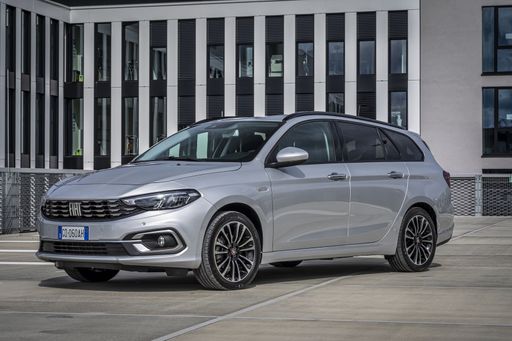 @ media.stellantis.com
@ media.stellantis.com
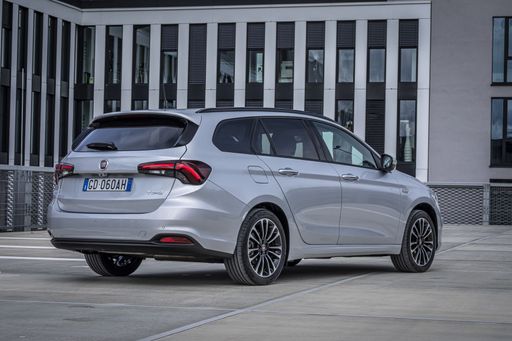 @ media.stellantis.com
@ media.stellantis.com
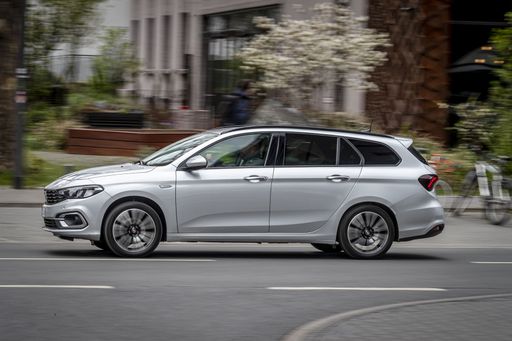 @ media.stellantis.com
@ media.stellantis.com
Toyota Proace City
The Toyota Proace City High Roof Combi is designed to seamlessly blend practicality with comfort, making it an ideal choice for families and businesses alike. Its versatile interior allows for flexible seating and cargo arrangements, catering to a variety of transport needs. Equipped with modern technology and advanced safety features, this vehicle ensures a reliable and secure driving experience.
details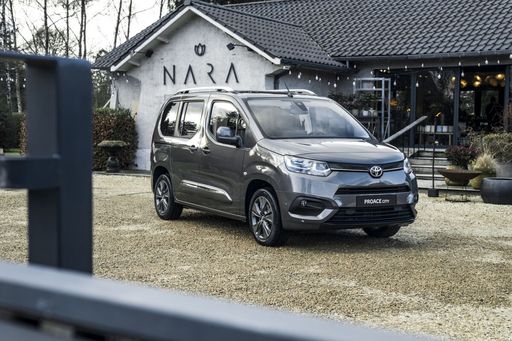 @ Toyota Deutschland
@ Toyota Deutschland
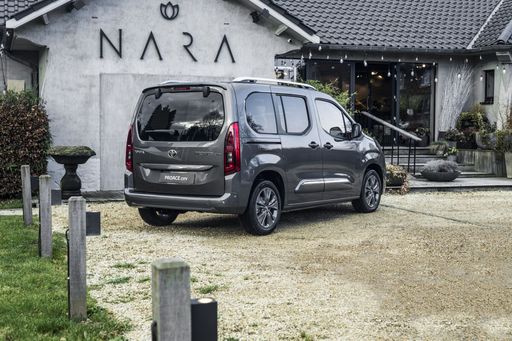 @ Toyota Deutschland
@ Toyota Deutschland
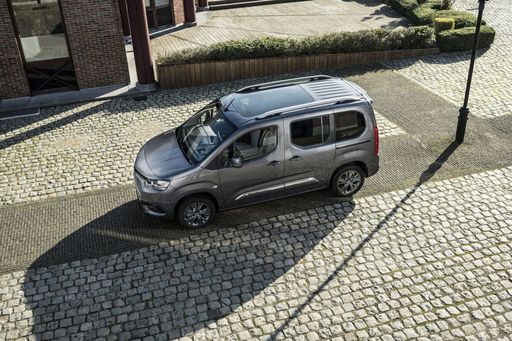 @ Toyota Deutschland
@ Toyota Deutschland
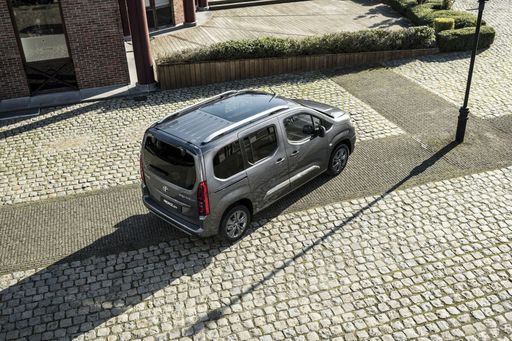 @ Toyota Deutschland
@ Toyota Deutschland
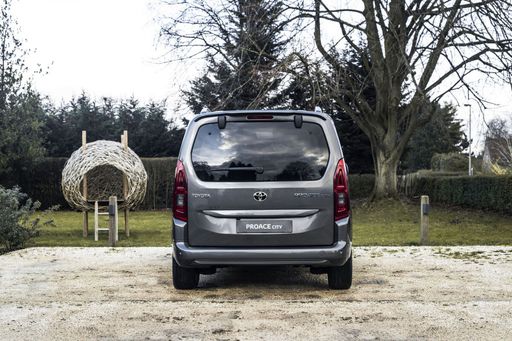 @ Toyota Deutschland
@ Toyota Deutschland
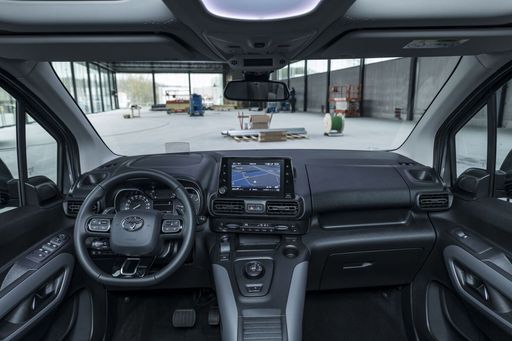 @ Toyota Deutschland
@ Toyota Deutschland

|

|
|
|
|
Costs and Consumption |
|
|---|---|
|
Price
21000 - 27000 £
|
Price
20800 - 42100 £
|
|
Consumption L/100km
4.7 - 5.4 L
|
Consumption L/100km
5.3 - 6.3 L
|
|
Consumption kWh/100km
-
|
Consumption kWh/100km
18.10 kWh
|
|
Electric Range
-
|
Electric Range
343 km
|
|
Battery Capacity
-
|
Battery Capacity
-
|
|
co2
122 - 125 g/km
|
co2
0 - 146 g/km
|
|
Fuel tank capacity
50 L
|
Fuel tank capacity
50 - 61 L
|
Dimensions and Body |
|
|---|---|
|
Body Type
Estate
|
Body Type
High Roof Estate
|
|
Seats
5
|
Seats
5 - 7
|
|
Doors
5
|
Doors
4 - 5
|
|
Curb weight
1455 - 1470 kg
|
Curb weight
1366 - 1664 kg
|
|
Trunk capacity
550 L
|
Trunk capacity
322 - 912 L
|
|
Length
4571 mm
|
Length
4401 - 4751 mm
|
|
Width
1792 mm
|
Width
1848 mm
|
|
Height
1514 mm
|
Height
1812 - 1818 mm
|
|
Payload
475 kg
|
Payload
525 - 869 kg
|
Engine and Performance |
|
|---|---|
|
Engine Type
Petrol MHEV, Diesel
|
Engine Type
Petrol, Diesel, Electric
|
|
Transmission
Automatic, Manuel
|
Transmission
Manuel, Automatic
|
|
Transmission Detail
Dual-Clutch Automatic, Manual Gearbox
|
Transmission Detail
Schaltgetriebe, Automatikgetriebe
|
|
Drive Type
Front-Wheel Drive
|
Drive Type
Front-Wheel Drive
|
|
Power HP
130 HP
|
Power HP
102 - 136 HP
|
|
Acceleration 0-100km/h
9.1 - 10.1 s
|
Acceleration 0-100km/h
11.5 - 13.2 s
|
|
Max Speed
206 - 207 km/h
|
Max Speed
135 - 186 km/h
|
|
Torque
240 - 320 Nm
|
Torque
205 - 300 Nm
|
|
Number of Cylinders
4
|
Number of Cylinders
3 - 4
|
|
Power kW
96 kW
|
Power kW
75 - 100 kW
|
|
Engine capacity
1469 - 1598 cm3
|
Engine capacity
1199 - 1499 cm3
|
General |
|
|---|---|
|
Model Year
2024
|
Model Year
2024 - 2025
|
|
CO2 Efficiency Class
D
|
CO2 Efficiency Class
E, A
|
|
Brand
Fiat
|
Brand
Toyota
|
Fiat Tipo Wagon
Introduction to the Fiat Tipo Station Wagon
The Fiat Tipo Station Wagon has long been a staple in the automotive world, celebrated for its practical design, spacious interior, and affordability. The 2024 model continues this tradition, offering impressive updates in technology and performance, making it a significant contender in the compact estate car market. Here, we take a closer look at what makes the Fiat Tipo Kombi a standout choice.
Engine and Performance
Under the bonnet, the Fiat Tipo Station Wagon showcases its versatility with a choice of powertrains. Its offerings include a 1.5 GSE Hybrid with a mild-hybrid system that enhances fuel efficiency and provides a responsive driving experience. This engine choice delivers 130 PS and achieves a commendable fuel consumption rate of 5.4 L/100km.
For diesel enthusiasts, the 1.6 MultiJet engine provides a robust performance with the same 130 PS but boasts an even lower fuel consumption of 4.7 L/100km. Both engine variants offer a front-wheel drive system which is complemented by either a dual-clutch automatic transmission or a traditional manual gearbox, ensuring a pleasurable driving experience tailored to individual preferences.
Advanced Technology and Innovations
The 2024 Fiat Tipo Station Wagon is equipped with a suite of modern technologies, enhancing both safety and convenience. The model features an advanced infotainment system that integrates seamlessly with smartphones, offering navigation, media, and communication tools via a sleek and intuitive touchscreen interface.
On the safety front, the Tipo Station Wagon is equipped with various driver assistance systems, including adaptive cruise control and lane-keeping assist, ensuring both comfort and security on the road. These innovations reflect Fiat's commitment to merging safety with cutting-edge technology.
Design and Comfort
From a design perspective, the Fiat Tipo Station Wagon maintains a sleek and modern aesthetic, characterised by clean lines and a distinctive front grille that conveys confidence. The vehicle's dimensions (4571 mm in length, 1792 mm in width, and 1514 mm in height) provide ample space for passengers and gear, while a generous boot offers 550 litres of cargo capacity.
Inside, the Tipo Station Wagon is designed with comfort in mind, accommodating five passengers comfortably. The interior cabin is spacious, with quality materials and ergonomic seating ensuring that long journeys are undertaken in comfort.
Efficiency and Environmental Considerations
Efficiency is at the core of the Fiat Tipo Station Wagons design, as evidenced by its low fuel consumption figures and CO2 emissions ranging between 122 and 125 g/km, securing a CO2 efficiency class of D. This makes the vehicle an environmentally conscious choice without sacrificing performance or convenience.
Conclusion
For those in search of a reliable, spacious, and technologically advanced vehicle, the Fiat Tipo Station Wagon stands out as an excellent option. Its combination of performance, efficiency, and modern technology, all wrapped in a stylish design, ensures that it remains a top choice for 2024 and beyond.
Toyota Proace City
The Versatile Toyota Proace City: A Gamechanger in the Van Segment
In the bustling world of automotive innovations, the Toyota Proace City stands out as a versatile, high-roof van that combines practicality with cutting-edge technology. Designed to cater to the needs of businesses and families alike, the Proace City makes a compelling case for itself with various powertrain options, impressive load capacity, and modern amenities. Let’s dive into the technical details and innovations that make this model a standout choice.
Powertrain Variety: Meeting Diverse Needs
The Toyota Proace City offers a diverse range of powertrains to meet different driving needs and preferences. Whether you're looking for the traditional power of internal combustion engines or the modern efficiency of electric propulsion, the Proace City has got you covered. The petrol options include a 1.2 Turbo engine, producing 110 PS with a consumption rate of 6.3 L/100km. For diesel enthusiasts, a robust 1.5 D-4D Diesel engine is available, offering power outputs up to 130 PS and a consumption as low as 5.3 L/100km. Moreover, the electric versions pack a 50 kWh battery that delivers 136 PS with an efficient consumption rate of 19.4 kWh/100km, providing an impressive range of up to 284 km.
Technological Advancements and Efficiency
Innovation in the Toyota Proace City extends beyond its engines. It boasts an impressive array of technologies aimed at enhancing efficiency and safety. The CO2 efficiency classes range from A to E depending on the model, with emissions that meet Euro 6 standards, reflecting Toyota’s commitment to sustainability. The integration of various automatic and manual transmission options provides drivers with flexibility and control, ensuring a smooth and efficient driving experience.
Comfort and Practicality: Inside the Proace City
Step inside the Toyota Proace City, and you are greeted with a spacious and well-appointed interior. Depending on the configuration, the van offers seating for five to seven passengers, making it ideal for both family use and commercial applications. The boot capacity ranges from 322 to 912 litres, ensuring ample space for all your cargo needs. With maximum payloads of up to 869 kg, the Proace City is designed to handle heavy-duty tasks without compromising on passenger comfort.
A Design for Every Purpose
The Toyota Proace City spans a length between 4401 mm and 4751 mm, providing a substantial yet manageable vehicle size. The consistent width of 1848 mm and height reaching up to 1818 mm offer a solid road presence while ensuring maneuverability in urban settings. The notable variant selection includes designations like Club, Comfort, Flow, and Team Deutschland, each with optional automatic configurations to match different lifestyle and business demands.
Affordability and Operational Costs
With a starting price range from €24,835 to €51,245, the Toyota Proace City provides an accessible entry into the segment of high-roof vans. Its economical efficiency extends to operational costs, with monthly expenses ranging from €1,071 to €1,181, showcasing financial viability for both private owners and fleet operators alike.
Conclusion
The Toyota Proace City stands as a formidable contender in the van market, offering a blend of flexibility, efficiency, and modern technology. Its range of powertrains, spacious interior, and low operating costs make it a practical choice for anyone from urban professionals to family adventurers. Whether it's for work or leisure, the Proace City proves that a utility vehicle can be both functional and sophisticated.
The prices and data displayed are estimates based on German list prices and may vary by country. This information is not legally binding.
